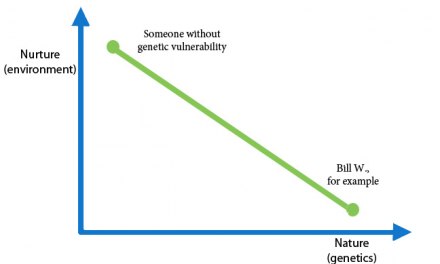Warning: Undefined variable $serie in /home/domains/treatmentandrecoverysystems.com/docs/wp-content/plugins/wp-series-manager/wp-series-manager.php on line 264
On the principle of starting with the most-available, easiest-to-access, demonstrably-effective tool, we usually advise even nonbelievers to try the Step fellowships. If they don’t work, there are other tools. However, the Steps may benefit from a little “re-engineering” to increase the nonbeliever’s chances of success. Here’s the next “Re-Engineered Recovery Tool,” the Seventh Step:
Step Seven: Humbly asked Him to remove our shortcomings
Okay, this step is just about asking Mythical Being to do something, right? Pointless, why not just ditch this one. Easy to dismiss.
Except. There’s an important word here that reveals the useful function of Step Seven: “Humbly.”
The experience of addiction is egocentric. To support their addiction, the addict has to progressively ignore the needs of others, even people they love. The demands of addiction take precedence, and by the late stages, addicts are looking at nearly everything and everybody in terms of how they relate to their consumption of booze or drugs.
Although this egocentricity looks like self-regard, family and friends of the addict may be well-aware of their self-hatred. This is behind the old description of the drinking alcoholic: “An egomaniac with an inferiority complex.”
The antidote for this toxic combination is being humble. Humility rules out arrogance, self-absorption, and self-centeredness. With Step Six, we conceded the need for help and prepared for what change might bring. But if perfectionism, long-held resentments (“they never admitted I was right about that…”) or the unreasonable expectations we have of our wonderful selves get in the way, we’re still stuck.
Now that we understand the importance of humility, let’s go back and look at the concept of “asking for help” to remove our shortcomings. We don’t have to involve a Mythical Being for this. We can go back to the work we’ve already done with our re-engineered Step Two (see “Re-engineering Recovery Tools,”) re-affirm where our faith lies, and look there for our help.
To work Step Seven: Go back to the Fourth Step inventory you took, and look at the problems you identified. Focus on the troublesome character traits that make it harder to accept help or defer to someone else’s experience or judgment—things like perfectionism, arrogance, holding grudges, needing to be right, etc. Discuss these things with someone whose guidance you’ve chosen to seek in recovery, and record some ideas for dealing with these traits in the future.
How might you avoid them? What could you do instead of (for example) taking affront when someone questions your judgment or (another example) when you feel frustrated and want to just give up on something? If someone points out one of these behaviors, will you be able to avoid taking that as a criticism?
By thinking this out, sharing with a trusted guide, and having faith that you can leave these damaging behaviors behind, you’ll be meeting your help more than halfway.
These are posts belonging to the same serie:
- Recovery Without God
- Taking Charge by Having Faith
- Atheology for Recovery
- The Church of the Exalted Chemical
- Coordinates on the Recovery Map
- Finding a Skeptical Starting Point
- Re-Engineering Recovery Tools
- Nonbelievers Moral Inventory
- Taking the Fifth
- The Readiness is All
- The Damage Assessment
- Do-It-Yourself Repairs
- Good Practice Over Bad Habit
- Balancing Act














one observation is the difference between humility and humiliation – I have always been encouraged to look at a dictionary to clarify my own understanding (even as an english major) and definition of a word … very helpful advice that I pass along to sponsees as well.
The “force” behind the universe, ” god” is NOT A HIM. That’s my issue with this step…and the fact that being humble and knowing it is NOT a problem for women. We take on humility too much and suffer for it and drink to escape our anguish.
I think the are two key elements to this step. First is to be humble, and the second is to change. And be willing to change. I feel that this is the difference between staying sober by white knuckling it and changing who you are to take control of your addiction.